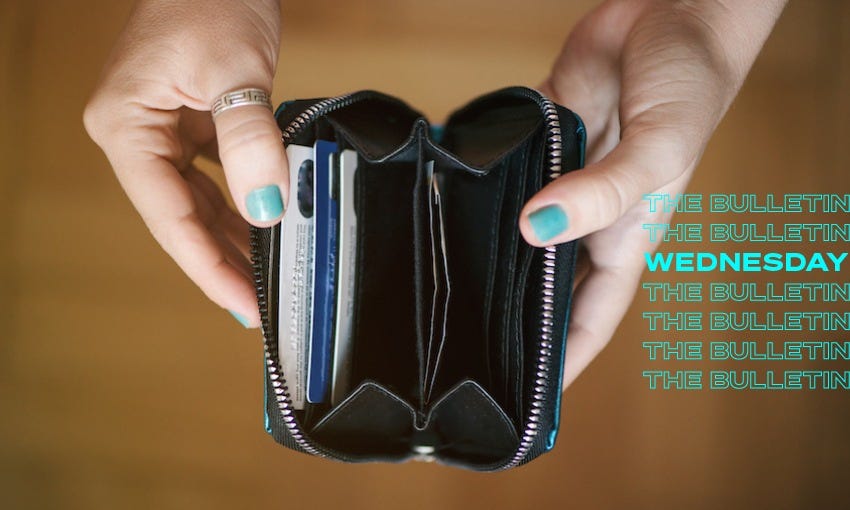Doing it tough
The country's attention is shifting from the pandemic to New Zealanders who are falling behind
Mōrena and welcome to The Bulletin for Wednesday, March 23, by Justin Giovannetti. Presented in partnership with Z Energy.
In today’s edition: Experts urge continued mask use; little improvement with mental health boost; heartbreaking scenes in Mariupol; but first, the crisis of crises.
With fast rising prices and slow wage growth, many are falling behind. (Getty Images)
Preparing for life after Covid in New Zealand.
The prime minister will announce a major loosening of Covid restrictions later today, with the use of vaccine mandates and passes expected to end in the coming weeks. Mask use is likely to continue. Along with most Covid rules falling away, two years of border restrictions are nearly over. The first planeload of tourists will arrive in three weeks. Replacing the pandemic in the minds of New Zealanders is the economy. The oil shock caused by the war in Ukraine and ongoing global disruptions have pushed economic worries off the business pages to the top of the pile. Inflation was the country’s top concern last month, followed by housing, according to Ipsos.
Dealing with the crisis of crises in Aotearoa.
It seems unlikely voters will give Jacinda Ardern’s Labour government a third mandate next year based solely on its successful Covid response. Instead, National and Act have capitalised as parliament has shifted away from the pandemic to concerns around the economy. Despite a surge in the polls for the right-leaning parties, their preferred solution of tax cuts might not entice centrist New Zealanders come voting day. New Zealand has one of the lowest tax regimes in the developed world, according to the OECD. Instead, success post-Covid could depend on how the country’s leaders propose to deal with an ongoing crisis of crises. The word crisis is mentioned nearly daily in this newsletter, for the cost of living, housing, climate, mental health, literacy and more.
Nearly all those issues have worsened considerably in the past two years.
Consumer confidence in Aotearoa has now fallen to its lowest level since the 2008 global financial crisis. Stuff reports that households are reporting that their finances have deteriorated over the past year and worries are mounting over the coming months. The price of food and petrol has climbed far more quickly than incomes. For those on fixed incomes, the prospects could be dire in the coming months. Global supply chains haven’t been restored after two years of disruptions and China is now battling its worst outbreak of Covid-19. According to Reuters, the queues of ships outside major Chinese ports are growing longer and analysts warn of a shock to the price of goods in the coming months.
The government’s budget in May will have to deal with all of this.
Writing in the NZ Herald (paywalled), Simon Wilson has laid out the seven things he’d like to see in Grant Robertson’s budget. This is a time for big solutions to big problems that have been growing for a generation, he argues. “The effect of 30 years of underspending on core services and infrastructure. The deep damage to health services, transport, housing, education, water, crime, and they're just the things that hog the headlines, has been laid bare,” Wilson explains. Robertson’s budget could be the opening shot in Labour’s re-election campaign.
Looking for another idea to deal with the cost of living?
Bryce Edwards asks whether this is the time for the government to introduce public dental care. It would be an expensive undertaking, but free dental care would have an immediate impact on the wellbeing of struggling New Zealanders and their families. They generally don’t get much back from tax cuts. It would also be a memorable project for a government struggling to find a transformational purpose.
The prime minister’s “beyond omicron” speech is at 11am today.
The generous support of our members powers all of The Spinoff's journalism, including live updates, the award-winning collaborations between Toby Morris and Siouxsie Wiles, and richly reported feature writing.
As we continue to struggle against commercial headwinds, contributions from our members are more critical than ever. If you value what we do and have the means to do so, please make a donation today and support our mahi.
Don’t ditch masks: experts.
Widespread mask use is an essential tool in fighting Covid-19 and the government should maintain it, experts told Newsroom. The prime minister has indicated that she wants to keep mask rules for now, while both National and Act support continued mask use indoors. Some epidemiologists said the country needs an actual mask strategy that clearly tells New Zealanders what types of masks should be worn and where. Based on what we’ve seen overseas, a battle over mask mandates will likely be the next step after vaccine rules are dropped.
The Spinoff’s Covid data tracker has the latest figures.
Little improvement with $1.9 billion mental health boost.
The health minister launched a campaign yesterday to recruit mental health nurses, but a new report found that there’s been little improvement from the government’s marquee mental health spend. The NZ Herald reports that the programme hasn’t gone as far as expected, especially for young people. The Bulletin reported yesterday on growing worries that youth mental health is suffering and lacking from specialised help. The health minister said he was frustrated that the $1.9 billion wasn’t being spent quickly enough.
More woes at Wellington Water over fluoride debacle.
The capital’s water utility has suffered another string of bad headlines in recent days. First it unveiled that it stopped fluoridating water last year and didn’t tell the public. Now as the Dominion Post reports, Wellington Water said faulty fluoride equipment started misbehaving four years ago. Workers were adding doses of fluoride manually, in many cases adding too little and overdosing once, although that water never got out of the plant. Council was not told until recently and an independent inquiry is now underway. The water agency also announced that its plan to stop sewage overflows is now considered “unachievable”.
New Zealand about to run out of something unexpected: Co2.
At a time of high food prices, the closure of the Marsden Point oil refinery is about to make the situation worse. Stuff explains that carbon dioxide is a byproduct of refining and much of that Co2 is sold to the food and beverage industry. Meat, cheese, carbonated beverages and ready-to-eat meals depend on carbon dioxide for production or to prolong shelf life. The refinery processed its last load of crude oil earlier this month and is closing down, with Co2 shipments about to stop. More expensive foreign carbon dioxide is being brought in to replace it.
Long read: 20 days in Mariupol.
A team from the Associated Press were the last international journalists left in the besieged Ukrainian city when Russian troops started hunting them down. This is their story, documenting a dying city being battered by Russian forces in a brutal invasion. Mariupol was a middle class city with twice the population of Wellington only a month ago. Then it was ripped apart, bomb by bomb, street by street. There are now mass graves around the city. This is an exceptional and difficult story to read.
Got some feedback about The Bulletin, or anything in the news? Get in touch with me at thebulletin@thespinoff.co.nz
Emily Writes shares tips from people who have had Covid. Chris Schulz looks at why Auckland’s Action Ninja World has been closed all summer. Julie Fairey explains that sometimes it’s supposed to flood. Reweti Kohere speaks with the New Zealand company offering a 100-year cast-iron guarantee. Sam Brooks reviews Ghostwire: Tokyo, which might be Bethesda’s best game yet.
White Ferns reset is long overdue: Dylan Cleaver.
A day of reckoning is coming for New Zealand Cricket, writes Dylan Cleaver for The Spinoff. After the White Ferns all-but-official failure at the World Cup (the chances of them moving forward are exceedingly slim), they need to face the fact that they have a shallow talent pool and dated game.













